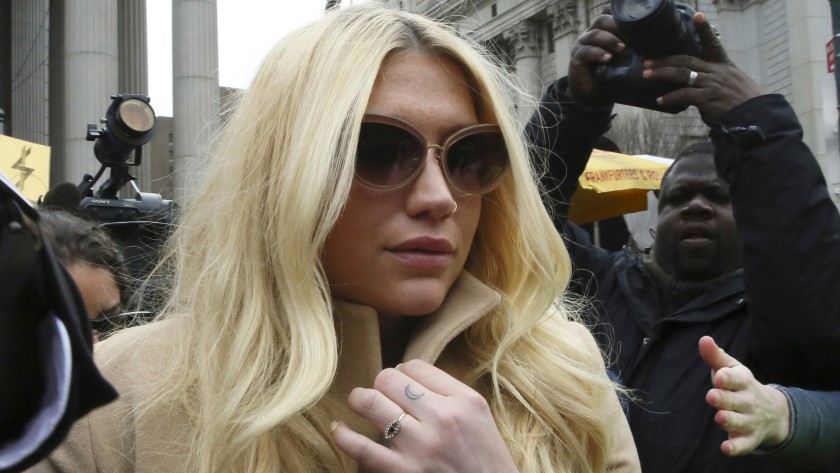A court ruled that Kesha’s former producer, Dr. Luke, isn’t a ‘public figure.’ Here’s why that’s a problem.

Update: This blog post has been updated to reflect the media coalition’s amended friend-of-the-court brief, filed on May 21, 2020, correcting the number of news articles mentioning Dr. Luke.
In February, a New York trial court dealt a blow to pop music star Kesha, ruling that the American music producer she has accused of misconduct is not a “public figure.”
The producer, Lukasz Gottwald, aka Dr. Luke, claims that Kesha made statements falsely accusing him of sexual assault, serious allegations he says harmed his reputation. The court’s ruling increases the likelihood that Dr. Luke will prevail in his defamation lawsuit, but the significance of the pre-trial decision not to categorize Dr. Luke as a public figure stretches far beyond the high-profile legal spat between Kesha and her former producer.

The ruling could have a chilling effect on women who speak out against alleged abuse in the wake of the #MeToo movement, and it has troubling implications for journalists seeking to hold the wealthy and powerful accountable, according to a friend-of-the-court brief filed last week by a 17-member media coalition led by the Reporters Committee for Freedom of the Press.
The media coalition filed the brief with a New York appeals court, where Kesha is challenging the trial court’s decision. The brief argues that Dr. Luke is a public figure, meaning he must satisfy a higher burden of proof than a private figure to succeed in his defamation claim against Kesha.
“Dr. Luke is a tremendously successful, important, and powerful music producer,” said Eugene Volokh, a UCLA law professor who supervises the First Amendment Clinic at the UCLA School of Law, which represented the media coalition with the help of law firm Holwell Shuster & Goldberg LLP. “It’s important that everyone — both reporters and other professionals, such as Kesha — be able to discuss allegations against powerful people like that, with the protections against libel lawsuits provided by public-figure precedents such as New York Times v. Sullivan.”
New York Times v. Sullivan, a landmark case decided by the U.S. Supreme Court in 1964, recognized what’s known as the “actual malice” standard, which requires public officials, such as governors or other policymakers, and public figures, such as famous artists or athletes, who sue for defamation to prove that the allegedly defamatory statement was made with knowledge that it was false or with “reckless disregard for the truth.” This standard makes it more difficult for public officials and public figures to prevail on defamation claims, compared to private figures.
The media coalition’s brief, which urges the appeals court to reverse the ruling, stresses that categorizing Dr. Luke as a private figure could have serious implications for members of the news media. It points out the investigative reporting that has uncovered misconduct by influential men, including in the media industry, made possible by sources speaking on the record about purported mistreatment of women.
“Just as much as this court’s decision could silence women who seek to speak out against alleged abuses, it undercuts journalists’ ability to hold people in power to account,” said Reporters Committee staff attorney Caitlin Vogus. “It’s vital to ensure the law protects the press from lawsuits that could otherwise chill reporting on important public figures with significant influence on our culture and society.”
The legal battle between Kesha and Dr. Luke
Kesha and Dr. Luke have been battling each other in court since 2014, when the singer sued the producer, claiming that he sexually and physically abused her, and that his manipulation was the cause of her eating disorder.
Kesha sought to void the contracts that kept her career entangled in his sphere of influence. On the same day, Dr. Luke countersued for defamation and breach-of-contract. His representatives cast Kesha’s allegations as a “campaign of publishing outrageous and untrue statements” against the producer.
The New York trial court’s recent decision concerns statements made about Dr. Luke in various legal filings, as well as public statements made by Kesha, her lawyer, her PR firm, her mother and a supportive fan.
One of Kesha’s text messages also figures heavily in Dr. Luke’s defamation claim. In February 2016, Kesha sent a text to pop star Lady Gaga, expressing frustration that fellow singer Katy Perry had not come forward with her own allegations against Dr. Luke. “[S]he was raped by the same man,” the message reads. (In a deposition, Perry denied that Dr. Luke raped her.)
In its decision addressing one part of the legal dispute, the court concluded that Dr. Luke is not a public figure because the public has not recognized him as a “household name,” even if he is known in the music industry. Further, the trial court found, Dr. Luke does not fall into even the “limited purpose” category of public figures, since “he never injected himself into the public debate about sexual assault or abuse of artists in the entertainment industry.”
The ‘actual malice’ standard
The trial court’s decision that Dr. Luke is a private figure sharply increases the likelihood that he will prevail on his libel claim against Kesha. That’s because it’s much easier for private figures to prove that someone defamed them.
Defamation — an umbrella term that includes libel for written words, and also “slander” for spoken language — occurs when false statements are made about a person that cause harm to his or her reputation.
As the court’s ruling explains, public figures have a more expansive communications platform than private figures, through social media, access to news outlets, and more. Moreover, public figures who step into the public spotlight are inherently subject to a higher level of critique.
To account for this difference, American courts have different standards of “fault” for private and public figures. If a private figure sues someone for defamation, he or she usually only has to show that the person making the allegedly false statement acted negligently — or didn’t do their homework, so to speak.
If a public figure brings the same lawsuit, however, he or she must prove that the person knowingly made false statements or that the person acted with a “reckless disregard for the truth.” Without proof of “knowing falsity” or “reckless disregard,” a public figure cannot prevail on a defamation claim.
Under the higher standard of fault for public figures, in other words, Dr. Luke’s claim against Kesha would be much more difficult to prove.
Why Dr. Luke should count as a public figure
Under common law, which is created by judges’ rulings rather than statutes passed by legislatures, public figures are people who receive extensive press coverage, who have broad name-recognition, and who voluntarily seek the public spotlight.
In 2012, Dr. Luke had more than 200,000 Twitter followers. By 2013, the media coalition’s brief notes, Dr. Luke had written 40 hit songs, 16 of which topped the Billboard Hot 100 chart. By October 2014, when he filed his defamation claim, Dr. Luke’s success as a music producer had landed his name in headlines at least 39 times and in news articles 577 times in more than 50 major publications; he had also received four Grammy nominations.
Through illuminating his close relationships with stars in the industry — Britney Spears, Katy Perry, Miley Cyrus, Pink, Kelly Clarkson, and Kesha — Dr. Luke encouraged the press’ portrayal of him as “a pop star’s best friend,” painting a portrait of a well-connected man who had successfully influenced young artists’ careers. Dr. Luke promoted his artists — and therefore his brand — through social media, and by hiring a PR firm to help expand his influence, according to court documents.
The producer sought the spotlight to further his career in the entertainment industry, and attained it. Moreover, Dr. Luke injected himself into a public debate about how business executives treat their artists by making many social media posts revealing his personal relationships with the artists whose careers he oversees — and controls. As a result, he is no longer entitled to protections afforded to private members of society.
“To find otherwise,” the media coalition argues, “paves the way for a new class of well-known, well-connected, and wealthy people to stymie free speech without the protections that the First Amendment requires in cases such as this.”
The Reporters Committee regularly files friend-of-the-court briefs and its attorneys represent journalists and news organizations pro bono in court cases that involve First Amendment freedoms, the newsgathering rights of journalists and access to public information. Stay up-to-date on our work by signing up for our monthly newsletter and following us on Twitter or Instagram.
Photo of Kesha by Mary Altaffer / Associated Press
Photo of Dr. Luke by Charles Lee